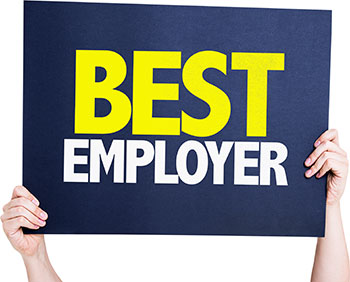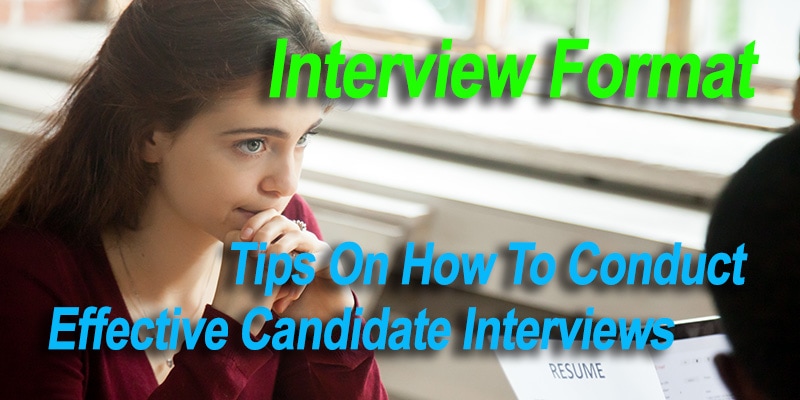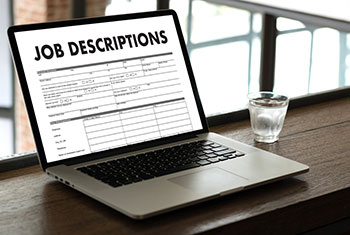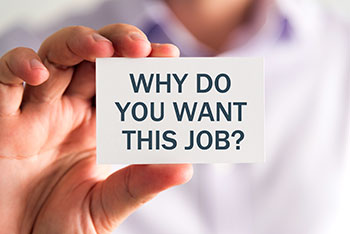Employee turnover costs US businesses $160 billion a year. And the average cost per hire for companies is $4,129. These are sobering statistics, especially in today’s highly competitive market where every dollar of expenditure counts. Getting the interview process right is one way you can impact on your bottom line. Not only will your spending on recruitment and retention decrease, you will also be making a big difference to employee engagement. You see, the process of engaging with staff members starts with their very first interaction with the business, which is usually the interview. A positive experience will go a long way to ensuring you enjoy a fruitful and lengthy relationship with the employee. So, what’s the recipe for the perfect interview format? Here are our top tips on how to conduct effective candidate interviews.
Interview Format Preparation
Candidates are often told that the key to a successful interview is preparation, but what about employers? How much time do you spend on planning the interview format? For the majority of us, the answer will be not enough. We’re not talking about days of preparation here, just a few hours is all that’s required. Here are some of the things you need to consider as part of your preparation:
Review The Job Description
The first step is to have a look at the existing job description. Consider whether it is still current or whether it needs to be updated. The job description provides the framework for your selection criteria, so it’s important it accurately reflects the current requirements of the job role.
Review The Candidate’s History
Sit down and review the information submitted by those candidates that have passed the initial hurdle and have been selected for an interview. Read through their resume, cover letter or application form and make a note of any queries. Perhaps there’s a gap in their work history that needs to be explored. Or maybe they have a hobby or volunteer in some capacity. Hobbies and other interests can reveal a lot about a candidate’s personality, indicating how they will perform in the job and so it’s well worth exploring in the interview.
Decide On The Interview Format
Most interviews involve one or more employer representatives sitting around a table and asking questions of the candidate. This may be the most popular format, but there are other possibilities. Below is a discussion of some of the advantages and disadvantages of the various interview formats/types so that you can select the one that best fits with the job role and the company.
Interview Format Types
Individual Interview
This interview format involves the candidate and a single interviewer and so allows for an in-depth discussion. Because only one employer representative is included, it’s also a relatively quick and cost-effective process. However, the decision to hire rests with only one individual which could lay the organization open to accusations of bias or unfairness. In addition, other members of the team who may be required to work closely with the individual are not involved in the process at all.
Group Interview
In this interview format, a panel of interviewers asks questions of the candidate and so it means that other team members can be involved in the selection process. Also, the decision on whether to hire does not rest with only one individual. A group interview, however, does not lend itself to the same depth of discussion as the individual interview does.
Multiple Round Interview
This interview format allows for numerous one-on-one interviews with the candidate. This approach combines the best of both the group and individual interviews as it means lots of different viewpoints are incorporated into the selection process and there are multiple opportunities for in-depth discussions. The downside is that it is time-consuming and, therefore, is potentially a more expensive way of hiring. Furthermore, it’s pretty demanding and exhausting for the candidate, and you run the risk of losing them to a competitor.
Comfortable Interview Arrangements

Interview Location
Choosing a private room is essential. If at all possible, hold the interview in a room other than your office – a neutral meeting or break-out room is probably best. However, if your office is the only option then make sure your desk is clear and that you have muted or diverted your phone. Tell your colleagues that you are conducting interviews, so there are no interruptions. Some companies hold their interviews in the relatively relaxed surroundings of the staff cafeteria or even off-site in a local coffee shop, which may be worth exploring if you can ensure privacy.
Interview Scheduling
Consider carefully how you will schedule the interview. It’s likely that you will be interviewing several candidates, but do you arrange them all for the same day? This may seem like the most time-efficient option, but six hours of solid interviewing can take its toll even on the best of us, which means that by the end of the day you may not be capable of making such crucial selection decisions.
Similarly, scheduling an interview for 6 pm on a Friday because that’s the only slot available in your diary is unlikely to get the best response form the candidate. It looks as though you have attached very little priority to the interview process and the candidate may attach a similar level of priority.
 Candidate Stress
Candidate Stress
Furthermore, you may want to consider reducing the candidate’s stress levels as much as possible by advising them in advance of the topics that will be covered in the interview. This gives them the opportunity to prepare their answers in advance.
Another source of worry for candidates is what to wear. No one wants to make the wrong impression by over- or under-dressing for the interview. Making it clear to the candidate in advance what the dress code is for your business will go a long way to reducing their pre-interview anxiety levels.
Interview Questions
Now we come to the most important aspect of preparing for the interview – the questions. Your review of the job description will no doubt have given you some ideas about the topics and questions you need to ask as will your review of the candidate’s resume. Another way to approach it is to draw up a list of the required attributes for the job. You could even look to other top performers in your business and consider what it is that sets them apart and use that to frame your questions. Whatever methodology you use, setting the right questions is fundamental to a successful interview format. In fact, it’s so important that we need to look at it in detail.
Types Of Interview Questions
There are three main types of interview questions:
- Standard
- Behavioral
- Situation.
Standard Questions
These are the types of questions that are standard to most interviews. These questions are frequently used as openers and are designed to put the candidate at ease by allowing them to talk about their strengths. Their open-ended nature means that the candidate is given free rein to talk about themselves and the qualities they bring to the position.
Examples of standard interview questions:
- Can you tell me about yourself?
- How did you hear about this position?
- Why do you want this job?
- Tell us about your experience and why you are a good fit for this role?
 Behavioral Questions
Behavioral Questions
These types of questions seek to elicit information about behaviors and so often involve asking the candidate about a time or situation when they displayed a specific behavior.
The answers to these questions will help you determine if the candidate has the correct skills and competencies needed for the job and whether they have used them in the past.
Examples of behavioral interview questions:
- Can you describe a time when you were unable to complete a project or task on time? How did you handle that and what steps did you take in response?
- Have you ever had a disagreement with a manager or supervisor on an important issue at work? If so, how did you deal with it?
- Can you tell us about your experience of working with others in a team?
- Have you ever been in a situation where you needed to persuade other people who were not in your team to do something? How did you do it?
 Situational Interview Format Questions
Situational Interview Format Questions
These sorts of questions present a candidate with a real problem or issue they are likely to encounter in the job. Candidates are asked to walk you through how they would resolve it.
Situational interview questions give you the opportunity to assess how well a candidate is likely to perform on a variety of practical scenarios.
Examples of situational interview questions:
- What would you do if a customer complained about a product or service?
- How would you go about marketing our xyz product?
- What steps would you take to improve our company brand?
- What changes could we make to the customer experience to achieve more sales?
The majority of successful interviews will use a combination of all three interview questions. A good mix of questions means that you will be giving the candidate the best opportunity to demonstrate the breadth and depth of their knowledge, skills and experience. In addition, it gives you the employer the best chance to assess that knowledge and experience and ensure that it is a good fit for the job role and the company.
The most important thing though is to come up with a list of questions that are relevant and will provide you with firm information on which to make an assessment. Also, ask the same set of questions of all candidates so that you can compare like with like for an evaluation that’s as objective as possible.
Interview Format: Remember To Sell The Job

So, it’s worthwhile giving some thought as to how you will showcase your company as being the kind of place the candidate would love to work. Think about what makes you special. Invite the candidate to ask questions about the company and job, take them on a tour around the workplace, why not even introduce them to some of their potential fellow workers. Remember, selling the position and the company is now an essential part of the interview format.
Successful Interview Set Up
The best interview formats are those that are appropriate for the specific role and company. Adequate preparation and having a clear, consistent structure are essential. It’s worthwhile putting in the time and effort to get the interview process right. Not only will it leave all applicants (including those that are unsuccessful) with a good impression of your company, it will enhance your reputation in the marketplace as a good and sought-after employer. It also means that you will be getting off to the best possible start with the top applicant, 
MyHub Intranet Solutions can support a wide range of HR processes including candidate interviews, recruitment and retention as well as enhancing employee engagement. Our easy to set up and manage cloud intranet templates will deliver on these and a broad range of business operations and processes. Explore the possibilities with a free demo or a 14-day no obligation trial. Contact us today!




 Candidate Stress
Candidate Stress
 Behavioral Questions
Behavioral Questions Situational Interview Format Questions
Situational Interview Format Questions




0 Comments